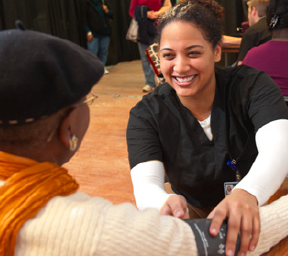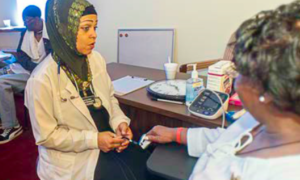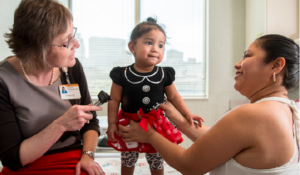By Les Gura
Although the Affordable Care Act has allowed more people to access health care, many barriers remain. But efforts are growing to reach underserved populations in new and lasting ways.
Richard Lord, MD, chair of Family and Community Medicine for Wake Forest Baptist Health, earlier this year became the institution’s vice president for clinical operations of population health.
In all of his roles, he focuses on improving access to care for all — a concept that has been with him since his early years as a doctor, first serving in a Chicago ghetto, then in rural Virginia and, since 1999, in Winston-Salem.
Lord says he is cheered by the fact that so many physicians, nurse practitioners, physician assistants and nurses in the region volunteer their time to free clinics.
“They believe it’s right that people have access to health care and access to primary care in particular,’’ he says.
In recent years, the goal of providing care to underserved populations is shifting.
 Today, Lord says, providers try to encourage healthier lifestyles that will keep people out of the emergency department for common problems that have gotten out of control, such as hypertension or diabetes.
Today, Lord says, providers try to encourage healthier lifestyles that will keep people out of the emergency department for common problems that have gotten out of control, such as hypertension or diabetes.
“My learning curve has been that it’s imperative to ask the community what their desire is,’’ Lord says. “Do they need us to provide care? Or do they want education? It’s a ‘do we give you a fish or teach you to fish’ type of thing.
“Some neighborhoods need medicines for people with diabetes, while in others you can spend time teaching health care topics. Because maybe if we help them learn to lose weight they won’t need diabetes medications or won’t need a hip replacement.”
Lord is enthusiastic about an effort under way through Wake Forest Baptist Health to launch a mobile health service. A van would visit five different sites each week, providing free health services to people without health insurance.
Free and low-cost services
Rachel Zimmer, DNP, NP-C, is leading the effort to establish the mobile health service. She says the project is on schedule to begin next March.
For Zimmer, there’s a personal drive behind helping people get connected with health care.
 “My own family has struggled with health care. My mother actually did not qualify for the health exchange and did not qualify for Medicaid; she fell right into the gap,” Zimmer says. “My sister is a single mother and works 70 hours a week. She struggles to get health care.”
“My own family has struggled with health care. My mother actually did not qualify for the health exchange and did not qualify for Medicaid; she fell right into the gap,” Zimmer says. “My sister is a single mother and works 70 hours a week. She struggles to get health care.”
Zimmer first became interested in care for the uninsured as part of her doctoral work at East Carolina University. She founded and runs the monthly Grace Free Clinic in Winston-Salem that began last fall at New Light Missionary Baptist Church.
When the mobile health service gets underway, it will add to a list of free and low-cost services available in the region. In addition, Wake Forest Baptist operates the Downtown Health Plaza in Winston-Salem, an outpatient clinic that offers many types of services to those in need, including an innovative approach to prenatal care, specialty clinics and patient connectors.
Zimmer says the proposed mobile health service would have nurse practitioners, physician assistants and nurses as regular staff, with medical residents and students also participating. Patients with complicated health needs would be referred to specialists, she says.
“The human spirit is amazing,” Zimmer says. “I’ve had single moms come in to Grace Clinic and they’re just looking for a listening ear. Sometimes you’re that respite for them when you’re really there to take care of their blood pressure. I think it’s just an honor to be able to serve people.”

